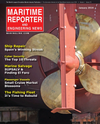
Page 11: of Maritime Reporter Magazine (January 2016)
Ship Repair & Conversion Edition
Read this page in Pdf, Flash or Html5 edition of January 2016 Maritime Reporter Magazine
Report: Methanol a Viable Alternative Marine Fuel
Methanol has a “historic opportunity” Line. “I believe this report can help raise looking for a greener shipping fuels.” Energy website: http://1.fc-gi.com/ as a marine fuel, according to a new re- awareness of this marine fuel and serve The full Methanol as a Marine Fuel re- LP=8264.
www.fcbi-energy.com port published by research group FCBI as an important source of facts to anyone port can be downloaded from the FCBI
Energy. Despite having many attributes that make methanol an attractive, low- emissions marine fuel, it has sometimes been overlooked in policy and industry discussions, according to FCBI Energy, whose report Methanol as a Marine Fuel ? nds the chemical to be a well-under-
The heart of a stood and safe to handle as a viable al- ternative to changing to low sulfur die- sel, installing scrubbers or converting to destroyer lies
LNG.
The new report, authored by marine in every vessel energy systems expert Professor Karin
Andersson of Chalmers University in we touch.
Sweden, set out to examine methanol’s viability as an alternative marine fuel.
The study found that methanol is abun- dant, biodegradable (the effects of a spill on the environment are low), compliant with the strictest international emissions standards, and could even be 100 percent renewable.
From a cost perspective, methanol prices show regional variation, and con- version costs are expected to drop dra- matically as experience mounts. More- over, as it is a liquid, methanol avoids the need for the expensive cryogenic equipment required for LNG, the report found. Infrastructure costs are relatively modest compared to potential alternative solutions, and current bunkering infra- structure only requires minor modi? ca- tions to handle methanol.
In 2015 Stena Line converted Stena
Germanica, a large Ro-Pax ship, to run on methanol. “The handling and instal- lation of a liquid like methanol had clear advantages over gas or cryogenic fuels regarding fuel storage and bunkering,” said Carl-Johan Hagman, CEO, Stena ul?o?u0o-|?b|_|_;v-l;ro?;u?v;70?|_;Cm;v|lb?b|-u?v_brvl
Commercial vessels may face different challenges than combat ships, but the best ones have equipment inside that’s built to last. That’s why many commercial boat builders have turned to PEPCO – the foremost power distribution company for military boats and vehicles – to power their ships
PLAINVILLE ELECTRICAL PRODUCTS COMPANY
EW[IPP3YVIUYMTQIRXGER[MXLWXERHXLIWLSGOSJGSPPMWMSRWKYRcVIERH ???lo?;u;7?;r1ol1ol underwater explosions during wartime. Can yours?
R&?"?-??r_o|o?v;7bmb???v|u-?om? &v;o=u;?;-v;7&?"?-??bl-];u?7o;vmo|1omv?|?|;ruo7?1|ouou]-mb?-?om-?;m7ouv;l;m|o=-m?hbm70?|_;&?"?-???
(Photo: Stena Line) www.marinelink.com 11
MR #1 (10-17).indd 11 1/8/2016 9:49:38 AM

 10
10

 12
12
